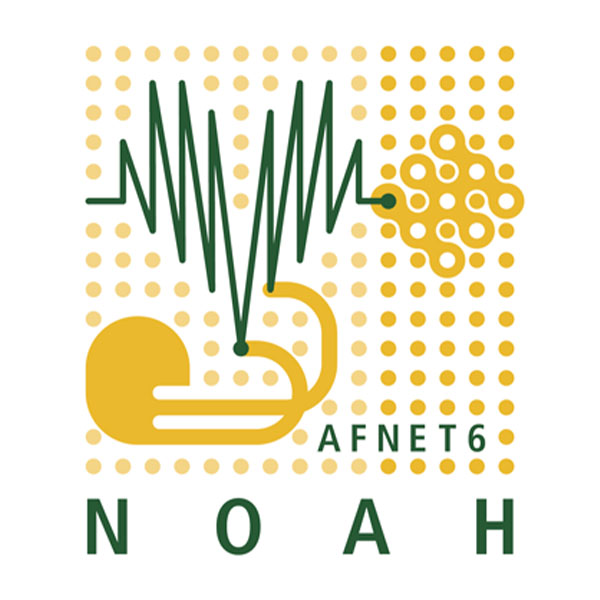
NOAH-AFNET 6
Non-vitamin K antagonist Oral anticoagulants in patients with Atrial High-rate episodes
study design
Investigator-driven, prospective, parallel-group, randomized, event-driven, double-blind, multicenter phase IIIb trial to evaluate the potential benefit of oral anticoagulation therapy in patients with AHRE, but without overt AF. The trial is to test whether treatment with the newly introduced NOAC edoxaban is superior to current therapy to prevent stroke, systemic embolism, or cardiovascular death in this patient group.

Inclusion criteria
![]() Pacemaker or defibrillator implanted for any reason with feature of detection of AHRE, implanted at least 2 months prior to randomization
Pacemaker or defibrillator implanted for any reason with feature of detection of AHRE, implanted at least 2 months prior to randomization
![]() AHRE (≥ 180 bpm atrial rate and ≥ 6 min duration) documented by the implanted device via its atrial lead and stored digitally
AHRE (≥ 180 bpm atrial rate and ≥ 6 min duration) documented by the implanted device via its atrial lead and stored digitally
![]() Age ≥ 65 years
Age ≥ 65 years
![]() In addition, at least one stroke risk factor leading to a CHA DS VASc score of 2 or more.
In addition, at least one stroke risk factor leading to a CHA DS VASc score of 2 or more.
Exclusion criteria
![]() Any disease that limits life expectancy to less than 1 year
Any disease that limits life expectancy to less than 1 year
![]() Participation in another controlled clinical trial, either within the past two months or still ongoing
Participation in another controlled clinical trial, either within the past two months or still ongoing
![]() Previous participation in the present trial NOAH – AFNET 6
Previous participation in the present trial NOAH – AFNET 6
![]() Drug abuse or clinically manifest alcohol abuse
Drug abuse or clinically manifest alcohol abuse
![]() Any history of overt AF or atrial flutter
Any history of overt AF or atrial flutter
![]() Indication for oral anticoagulation (e.g. deep venous thrombosis)
Indication for oral anticoagulation (e.g. deep venous thrombosis)
![]() Contraindication for oral anticoagulation in general
Contraindication for oral anticoagulation in general
![]() Contraindication for edoxaban as stated in the current SmPC
Contraindication for edoxaban as stated in the current SmPC
![]() Indication for long-term antiplatelet therapy other than acetylsalicylic acid or a need for treatment with any antiplatelet agent in addition to edoxaban, especially dual antiplatelet therapy (DAPT). Patients with a transient requirement for DAPT (e.g. after receiving a stent) will be eligible when the need for DAPT is no longer present
Indication for long-term antiplatelet therapy other than acetylsalicylic acid or a need for treatment with any antiplatelet agent in addition to edoxaban, especially dual antiplatelet therapy (DAPT). Patients with a transient requirement for DAPT (e.g. after receiving a stent) will be eligible when the need for DAPT is no longer present
![]() Acute coronary syndrome, coronary revascularisation (PCI or bypass surgery), or overt stroke within 30 days prior to randomisation
Acute coronary syndrome, coronary revascularisation (PCI or bypass surgery), or overt stroke within 30 days prior to randomisation
![]() End stage renal disease (creatinine clearance (CrCl) < 15 ml/min as calculated by the Cockcroft-Gault method)
End stage renal disease (creatinine clearance (CrCl) < 15 ml/min as calculated by the Cockcroft-Gault method)
![]() All persons exempt from participation in a clinical trial by law
All persons exempt from participation in a clinical trial by law
hypothesis
To demonstrate that oral anticoagulation with the NOAC edoxaban is superior to current therapy (antiplatelet therapy or no therapy depending on cardio-vascular risk) to prevent stroke, systemic embolism, or cardiovascular death in patients with AHRE but without overt AF and at least two stroke risk factors leading to a modified CHA2DS2VASc score of 2 or more.
Conclusion
Among patients with AHREs detected by implantable devices, anticoagulation with edoxaban did not significantly reduce the incidence of a composite of cardiovascular death, stroke, or systemic embolism as compared with placebo, but it led to a higher incidence of a composite of death or major bleeding. The incidence of stroke was low in both groups.
PATIENTS
STUDY SITES
Study duration
Study start
2016
End of study
2022
Study information for download
Publications
Bertaglia E, Blank B, Blomstrom-Lundqvist C, Brandes A, Cabanelas N, Dan GA, Dichtl W, Goette A, deGroot JR, Lubinski A, Marijon E, Merkely B, Mont L, Piorkowski C, Sarkozy A, Sulke N, Vardas P, Velchev V, Wichterle D, and Kirchhof P. Atrial high-rate episodes: prevalence, stroke risk, implications for management, and clinical gaps in evidence. Europace. 2019; 0, 1–9.
doi: 10.1093/europace/euz172
Becher N, Toennis T, Bertaglia E, Blomström-Lundqvist C, Brandes A, Cabanelas N, Calvert M, Camm AJ, Chlouverakis G, Dan GA, Dichtl W, Diener HC, Fierenz A, Goette A, de Groot JR, Hermans ANL, Lip GYH, Lubinski A, Marijon E, Merkely B, Mont L, Ozga AK, Rajappan K, Sarkozy A, Scherr D, Schnabel RB, Schotten U, Sehner S, Simantirakis E, Vardas P, Velchev V, Wichterle D, Zapf A, Kirchhof P. Anticoagulation with edoxaban in patients with long atrial high-rate episodes ≥24 h. Eur Heart J. 2024 Mar 7;45(10):837-849. doi: https://doi.org/10.1093/eurheartj/ehad771 PMID: 37956458; PMCID: PMC10919916.
Camm AJ, Simantirakis E, Goette A, Lip GY, Vardas P, Calvert M, Chlouverakis G, Diener HC, Kirchhof P. Atrial high-rate episodes and stroke prevention. Europace. 2017 Feb 1;19(2):169-179. doi: 10.1093/europace/euw279. Epub 2016 Feb 29.
Diener HC, Becher N, Sehner S, Toennis T, Bertaglia E, Blomstrom-Lundqvist C, Brandes A, Beuger V, Calvert M, Camm AJ, Chlouverakis G, Dan GA, Dichtl W, Fierenz A, Goette A, de Groot JR, Hermans A, Lip GYH, Lubinski A, Marijon E, Merkely B, Mont L, Nikorowitsch J, Ozga AK, Rajappan K, Sarkozy A, Scherr D, Schnabel RB, Schotten U, Simantirakis E, Vardas P, Wichterle D, Zapf A, Kirchhof P; NOAH‐AFNET 6 investigators. Anticoagulation in Patients With Device-Detected Atrial Fibrillation With and Without a Prior Stroke or Transient Ischemic Attack: The NOAH-AFNET 6 Trial. J Am Heart Assoc. 2024 Sep 3;13(17):e036429. doi: https://doi.org/10.1161/jaha.124.036429. Epub 2024 Aug 27. PMID: 39190564.
Kirchhof P, Blank BF, Calvert M, Camm AJ, Chlouverakis G, Diener HC, Goette A, Huening A, Lip GYH, Simantirakis E, Vardas P. Probing oral anticoagulation in patients with atrial high rate episodes: Rationale and design of the Non-vitamin K antagonist Oral anticoagulants in patients with Atrial High rate episodes (NOAH-AFNET 6) trial. Am Heart J. 2017 Aug;190:12-18. doi: 10.1016/j.ahj.2017.04.015. Epub 2017 May 3.
Kirchhof P, Toennis T, Goette A, Camm AJ, Diener HC, Becher N, Bertaglia E, Blomstrom Lundqvist C, Borlich M, Brandes A, Cabanelas N, Calvert M, Chlouverakis G, Dan GA, de Groot JR, Dichtl W, Kravchuk B, Lubiński A, Marijon E, Merkely B, Mont L, Ozga AK, Rajappan K, Sarkozy A, Scherr D, Sznajder R, Velchev V, Wichterle D, Sehner S, Simantirakis E, Lip GYH, Vardas P, Schotten U, Zapf A; NOAH-AFNET 6 Investigators; NOAH-AFNET6 sites and investigators. Anticoagulation with Edoxaban in Patients with Atrial High-Rate Episodes. N Engl J Med. 2023 Sep 28;389(13):1167-1179. doi: https://doi.org/10.1056/nejmoa2303062 Epub 2023 Aug 25. PMID: 37622677.
Lip GYH, Nikorowitsch J, Sehner S, Becher N, Bertaglia E, Blomstrom-Lundqvist C, Brandes A, Beuger V, Calvert M, Camm AJ, Chlouverakis G, Dan GA, Dichtl W, Diener HC, Fierenz A, Goette A, de Groot JR, Hermans A, Lubinski A, Marijon E, Merkely B, Mont L, Ozga AK, Rajappan K, Sarkozy A, Scherr D, Schnabel RB, Schotten U, Simantirakis E, Toennis T, Vardas P, Wichterle D, Zapf A, Kirchhof P. Oral anticoagulation in device-detected atrial fibrillation: effects of age, sex, cardiovascular comorbidities, and kidney function on outcomes in the NOAH-AFNET 6 trial. Eur Heart J. 2024 May 21;45(19):1733-1737. doi: https://doi.org/10.1093/eurheartj/ehae225. PMID: 38591192; PMCID: PMC11107119.
McIntyre WF, Benz AP, Healey JS, Lopes R. Response by McIntyre et al to Letter Regarding Article, “Direct Oral Anticoagulants for Stroke Prevention in Patients With Device-Detected Atrial Fibrillation: A Study-Level Meta-Analysis of the NOAH-AFNET 6 and ARTESiA Trials“. Circulation. 2024 Oct 8;150(15):e274-e275. doi: https://doi.org/10.1161/circulationaha.123.067512. Epub 2024 Oct 7. PMID: 39374331.
Schnabel RB, Benezet-Mazuecos J, Becher N, McIntyre WF, Fierenz A, Lee SF, Goette A, Atar D, Bertaglia E, Benz AP, Chlouverakis G, Birnie DH, Dichtl W, Blomstrom-Lundqvist C, Camm AJ, Erath JW, Simantirakis E, Kutyifa V, Lip GYH, Mabo P, Marijon E, Rivard L, Schotten U, Alings M, Sehner S, Toennis T, Linde C, Vardas P, Granger CB, Zapf A, Lopes RD, Healey JS, Kirchhof P. Anticoagulation in device-detected atrial fibrillation with or without vascular disease: a combined analysis of the NOAH-AFNET 6 and ARTESiA trials. Eur Heart J. 2024 Sep 2:ehae596. doi: https://doi.org/10.1093/eurheartj/ehae596. Epub ahead of print. PMID: 39222018.
Toennis T et al. The influence of atrial high rate episodes on stroke and cardiovascular death – an update. Europace 22 June 2023. doi: 10.1093/europace/euad166
Coordinating Investigator

Prof. Paulus Kirchhof
Hamburg
Your contact persons

Dr. Vincent Beuger
Quality Manager/PROJEKTMANAGER
Kompetenznetz Vorhofflimmern e.V.
Mendelstraße 11
48149 Münster
Mail: vincent.beuger@af-net.eu
Tel: 0251-980 1341
More information
Registration
ClinicalTrials.gov: NCT02618577
EudraCT number: 2015-003997-33
Support
The study is supported by
sponsor
Kompetenznetz Vorhofflimmern e.V. (Atrial Fibrillation NETwork, AFNET), Münster, Germany